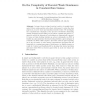Free Online Productivity Tools
i2Speak
i2Symbol
i2OCR
iTex2Img
iWeb2Print
iWeb2Shot
i2Type
iPdf2Split
iPdf2Merge
i2Bopomofo
i2Arabic
i2Style
i2Image
i2PDF
iLatex2Rtf
Sci2ools
SAGT
2009
Springer
2009
Springer
On the Complexity of Iterated Weak Dominance in Constant-Sum Games
Abstract. In game theory, a player’s action is said to be weakly dominated if there exists another action that, with respect to what the other players do, is never worse and sometimes strictly better. We investigate the computational complexity of the process of iteratively eliminating weakly dominated actions (IWD) in two-player constant-sum games, i.e., games in which the interests of both players are diametrically opposed. It turns out that deciding whether an action is eliminable via IWD is feasible in polynomial time whereas deciding whether a given subgame is reachable via IWD is NP-complete. The latter result is quite surprising as we are not aware of other natural computational problems that are intractable in constant-sum games. Furthermore, we slightly improve a result by Conitzer and Sandholm [6] by showing that typical problems associated with IWD in win-lose games with at most one winner are NP-complete.
Related Content
| Added | 27 May 2010 |
| Updated | 27 May 2010 |
| Type | Conference |
| Year | 2009 |
| Where | SAGT |
| Authors | Felix Brandt, Markus Brill, Felix A. Fischer, Paul Harrenstein |
Comments (0)

